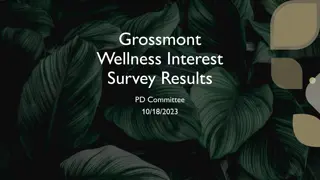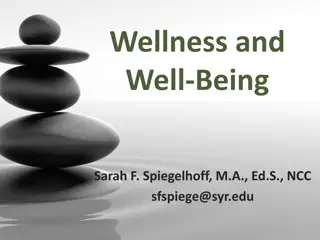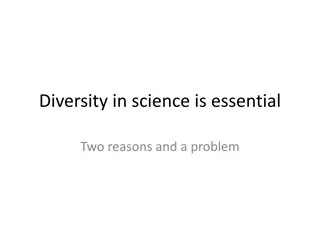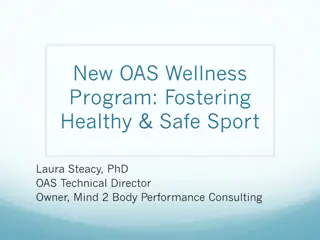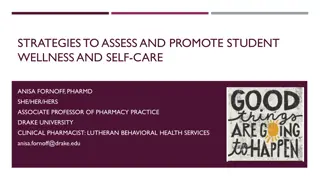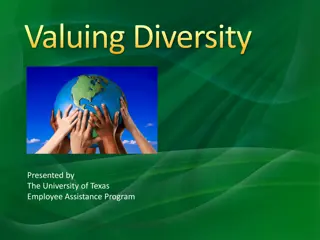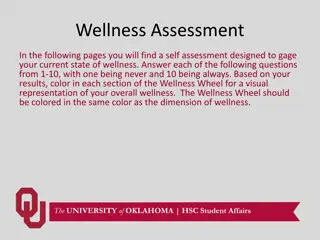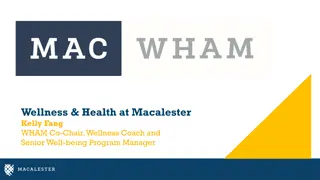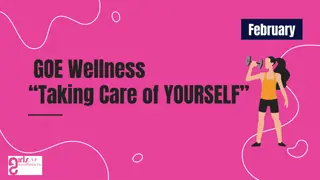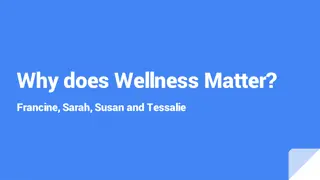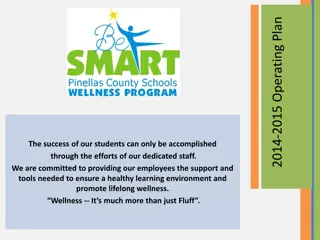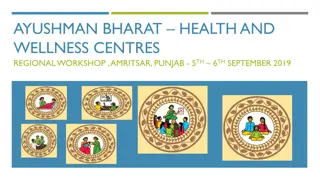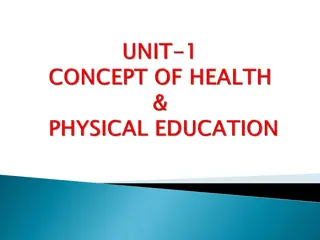Exploring the Diversity of Health Science and Wellness Perspectives
Health Science is an interdisciplinary field that integrates science, technology, engineering, and mathematics into healthcare delivery with a focus on holistic health. This course delves into various approaches to health care, including Western, Indigenous, traditional, complementary, and alternative methods. It explores changing beliefs about health and wellness over time and across cultures, inviting critical analysis of what it means to be healthy and the factors influencing individual well-being.
Download Presentation

Please find below an Image/Link to download the presentation.
The content on the website is provided AS IS for your information and personal use only. It may not be sold, licensed, or shared on other websites without obtaining consent from the author. Download presentation by click this link. If you encounter any issues during the download, it is possible that the publisher has removed the file from their server.
E N D
Presentation Transcript
What is Health Science? Health Science is: Big idea of this course = Website:
What is Health Science? Health Science is: an applied science that addresses the use of science, technology, engineering and mathematics in the delivery of healthcare. Big idea = There are many different fields of study and careers that contribute to health science. Health depends on achieving homeostasis through balancing all dimensions of holistic health. Loganpetlak.ca/Health-Science-20
Philosophy and Ethics HS20-HC1 Analyze how Western, Indigenous, traditional, complementary and alternative approaches to health care contribute to a holistic perspective (e.g., mental, emotional, physical and spiritual) of health.
Indicators! a. Identify how humanity s beliefs about health, wellness, illness, disease, and treatment have changed over time. (STSE) b. Discuss the importance of and difficulties in defining terms such as Western, Indigenous, traditional, complementary, and alternative approaches to health care within a current global context. (K, A, S, STSE) c. Assess how health, wellness, illness, disease, and treatment (e.g., Circle of Life disharmony of body energies, being symptom free, and healthy lifestyle choices) are addressed in Western, Indigenous, traditional, complementary, and alternative approaches to health care. (K, A, STSE) d. Investigate the intended results of using natural products (e.g., herbs, vitamins, minerals, probiotics, and essential oils) and mind and body practices (e.g., acupuncture, various massage therapies, yoga, spinal manipulation, relaxation techniques, meditation, and movement therapies) and other complementary and/or alternative approaches to health care. (K, A, STSE) e. Examine the significance of rituals, place based ceremonies, plants, and traditional herbs in Indigenous and traditional approaches to health care. (K, A, STSE) f. Describe the role of clinical based studies (e.g., randomized, blind, double-blind, and placebo) in understanding Western approaches to health care. (STSE) g. Provide examples of ways in which one or more of the approaches to health care might be implemented together to support the health and wellbeing of an individual. (K, A, STSE)
What does it mean to be healthy or have good wellness ? Identify how humanity s beliefs about health, wellness, illness, disease, and treatment have changed over time. (STSE) Who is the healthiest person you know? What makes them healthy? Why would our answers or definitions differ? Why would this answer be different in different parts of the world or at different points in history?
What does it mean to be healthy or have good wellness ? Identify how humanity s beliefs about health, wellness, illness, disease, and treatment have changed over time. (STSE) Who is the healthiest person you know? What makes them healthy? Why would our answers or definitions differ? People view health differently some may do some things unhealthily but other things more healthily Why would this answer be different in different parts of the world or at different points in history? In the past, being overweight was a sign of health because you were adequately nourished. Now, it s almost the opposite.
Varying Approaches to Health and Ability Different points in history view health differently Let s look at the history of disability .
Late 1800s In the late 1800 s, the social norm of dealing with a disabled family member was to keep them hidden away within the family home A disabled child was seen as shameful and they were not accepted in public - -
Late 1800s Continued Administrative agencies began constructing institutions for disabled family members The main goal during this time was to keep them segregated from society Disable people were often pitied, ridiculed, rejected, feared, or objects of fascination. - - - Joseph Merrick
What is a disability? A disability is: a physical or mental condition that limits a person s movement, senses, or activities. Examples include: - Down syndrome - MS - Paralysis - Parkinsons - Loss of limbs - Muscular dystrophy - Blind - Deaf - -
1900s The institution model of dealing with disabled people became popular in the early 1900 s This style of care was common practice until the 1960 s. In the 1960 s a paradigm shift began the acceptance of disabled people within society - - - Temple Grandin -
1970s The 1970 s were the start of integrating individuals with different abilities into society Institutions still exist today, but are structured as come of your own free will and you are allowed to leave - -
Recent History In the 1990 s came laws against discriminating based on ability These laws also prevented goods and services from being withheld from people with differing abilities - - Contemporary portrayal of individuals with Autism/Aspergers: The Good Doctor Big Bang Theory Atypical -
Perspectives on what is Healthy? How do we view disability now? How was it different in the past? Is being on your phones too much bad for you or is it the new norm? Eugenics used to be a prevalent ideology, is it good or bad? Is Nature Deficit Disorder a thing? Should we be outside more? Importance: Our perceptions of health are subjective (meaning it can change from person-person)
What is health? physical condition of a living organism Good health = optimal functioning of an organism
What is health? Functioning of the body Vital signs - proper functioning The state your body is in Emotional, physical, spiritual, mental - Wellbeing
What is wellness? Capacity of which an organism can function at
What is wellness? how you use or apply your health in your daily life How you believe your health is going
What is wellness? Mental, physical, emotional, and spiritual Wellbeing of the body, rather than the state of the body Study of the body Mental condition
Health and Wellness is connected Health and Wellness is connected The World Health Organization (WHO) defines health as being A state of complete Physical, mental, and social well-being and not merely the absence of disease or infirmity in 1948. Where have we heard these terms before?
Health and Wellness is connected Health and Wellness is connected The World Health Organization (WHO) defines health as being A state of complete physical, mental, and social well-being and not merely the absence of disease or infirmity in 1948. Where have we heard these terms before? The idea of balance between areas of wellbeing is not a new concept Indigenous cultures view health as being well in all areas of life (mental, physical, social, and spiritual) and all components are equally valued - - As these approaches have become more widely held, phrases like Holistic Health have emerged.
Holistic Health Should have heard it in health before what does it mean? Overall ___________ and _____________ between all of your different ___________ of health. _______ Socioemotional _______ Spiritual This means __ ____ _______, ____ ____ ________. Important to remember that this involves the most complete form of health and needs to be considered beyond simply treating a condition with a pill this is what CAM (_________________________________) keeps in mind.
Holistic Health Overall balance and well-being between all of your different dimensions of health. Physical what are the literal/deeper meanings? Socioemotional what are the literal/deeper meanings? Mental what are the literal/deeper meanings? Spiritual what are the literal/deeper meanings? This means If one suffers, all can suffer. Example? Important to remember that this involves the most complete form of health and needs to be considered beyond simply treating a condition with a pill this is what CAM (complimentary and alternative medicine) keeps in mind.
What is physical health (literal)? Wellbeing of your body - organ functions Habits Condition of muscles and bones (all systems) Being free of illness
What is physical health (deeper)? Action Skills Sustainability - - -
What is mental health (literal)? Psychological wellbeing Ex. of mental health conditions: bipolar, depression, anxiety. Mindset and outlook on life Stimulating and using the mind
What is mental health (deeper)? Understanding Awareness Perspective Leadership - - - -
What is emotional health (literal)? Lack of emotional disorders Strong relationships Feeling and how you deal with them Do your emotions drive you? Social behaviours, feelings of inclusion
What is emotional health (deeper)? Relationships Empowerment Cooperation Struggle - - - -
What is spiritual health (literal)? Values and beliefs Yoga and meditation Identifying your own sense of meaning and purpose (IT S NOT NECESSARILY BEING RELIGIOUS)
What is spiritual health (deeper)? Dignity Values Connection Reflection - - - -
Western versus Alternative Medicine (Types of Medicine) - Discuss the importance of and difficulties in defining terms such as Western, Indigenous, traditional, complementary, and alternative approaches to health care within a current global context. (K, A, S, STSE) Western (conventional) medicine - Holistic health Complimentary medicine Alternative medicine
Western versus Alternative Medicine (Types of Medicine) - Discuss the importance of and difficulties in defining terms such as Western, Indigenous, traditional, complementary, and alternative approaches to health care within a current global context. (K, A, S, STSE) Western (conventional) medicine - The science and practice (by Health Care Providers) of the diagnosis, treatment, and prevention of disease through experimental study and testing. This is typically done through medications and surgery. What we consider conventional medicine. Historically just focused on treating the illness of the patient and didn t look at holistic health. Holistic health health includes not just illnesses of the body, but of the mind and soul (well-being physically, mentally, emotionally, and spiritually). Complimentary medicine is using conventional medicine (pills, surgeries, etc.) and alternative medicine (yoga, naturopath, chiropractor). Also called CAM. Alternative medicine a medical treatment that may not be scientifically tested, regulated or proven. Alternative medicine has become arguably more common in recent history (last 50 years).
Traditional Medicine What is traditional medicine?
Traditional Medicine What is traditional medicine? Sum total of the knowledge, skills, and practices based on the theories, beliefs, and experiences indigenous to different cultures, whether explicable or not, used in the maintenance of health as well as in the prevention, diagnosis, improvement or treatment of physical and mental illness. In other words: All the ideas and practices of a particular group as it relates to health and well-being.
How might all these phrases be somewhat difficult to classify? How might all these phrases be somewhat difficult to classify, relatively speaking (in a global context)? Ie. Why would it be incorrect to call some things just traditional or alternative ? Some medicines that are traditional in one location are alternative in another and this may make it sound worse than other, conventional medicine.
How might all these phrases be somewhat difficult to classify? How might all these phrases be somewhat difficult to classify, relatively speaking (in a global context)? Ie. Why would it be incorrect to call some things just traditional or alternative ? Health practices that are traditional for a particular culture are alternative for another. The term traditional is relative based on where the medicine originated and where it is practiced.
Complimentary and Alternative Medicine (CAM) What is CAM Allopathy Complementary medicine Alternative medicine Complete the Complimentary and Alternative Medicine Handout Correct hand in.
Complimentary and Alternative Medicine (CAM) What is CAM A group of practices and products that are not a strict part of conventional medicine Allopathy conventional medicine or common and usual practice of medicine Complementary medicine alternative medicine used with conventional medicine Alternative medicine used instead of conventional medicine Complete the Complimentary and Alternative Medicine Handout Correct hand in.
Health and Wellness Perspective and Worldview is important how might individuals holding a specific one of these perspectives think? Perspective towards Illness : Perspective towards Wellness : Perspective towards Disease : Traditional (note: there are many different cultures) Western Complimentary and Alternative
Health and Wellness Perspective and Worldview is important how might individuals holding a specific one of these perspectives think? Perspective towards Illness : Perspective towards Wellness : Perspective towards Disease : Traditional (note: there are many different cultures) Example: illness is a result of poor decisions or even sin . Example: state of mind being at peace with world. Example: could be shameful Out of balance or abnormal functioning of the body in a sickness sense. Treat the sickness Absence of illness. Good functioning of body. Western Curable or treatable Out of balance in a holistic sense. treat the whole person Complimentary and Alternative Doesn t just affect you involves family. Holistic well- being
Health and Wellness Approaches Which perspective might each of these apply to? Circle of Life Healthcare Disharmony of body energies Being symptom free Healthy lifestyle choices Why are these not potentially wrong? What are the implications of each (limitations, positives)?
Opening Video Medicine Men Go Wild The Hot Zone Bayaka Indicator: compare Western medicine to other cultures medicine. Watch the video/documentary - https://www.youtube.com/watch?v=5KVLsiLeTN8 Note: You will see an infected monkey getting cooked and chopped up. And a baby cut with a razor to try to help with an infection. Complete the associated question-sheet. Key Questions/Takeaways What is natural selection and how is it at work? What are the similarities and differences between Western Medicine and other forms of medicine?
Traditional Medicine Meditation
Traditional (alternative) Medicine - Meditation What cultures meditate? What are the benefits?
Traditional (alternative) Medicine - Meditation What cultures meditate? East Indian Religions (Hinduism, Buddhist, Judaism and Christianity) meditation is now a global practice not culture-specific What are the benefits? Decreases tension, boosts immune system, lowers blood pressure, reduce anxiety attacks.
Traditional Medicine - Meditation How to: - Sit or lie comfortably. - Close your eyes. - Make no effort to control the breath; simply breathe naturally. - Focus your attention on the breath and on how the body moves with each inhalation and exhalation. Notice the movement of your body as you breathe. Observe your chest, shoulders, rib cage and belly. Make no effort to control your breath; simply focus your attention. If your mind wanders, simply return your focus back to your breath. Maintain this meditation practice for 2 3 minutes to start, and then try it for longer periods. Let s try! There are others online! http://marc.ucla.edu/body.cfm?id=22
Indigenous Health Practices Traditional/Alternative/Conventional
Indigenous Health Focuses on treating the person as a whole, not just the condition Balance and harmony - -


